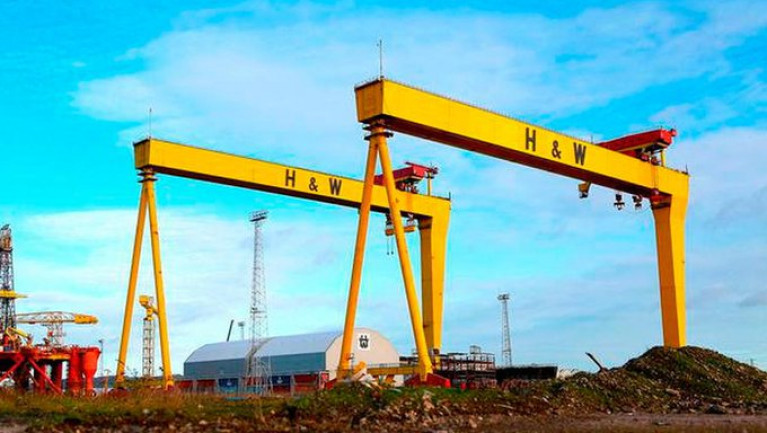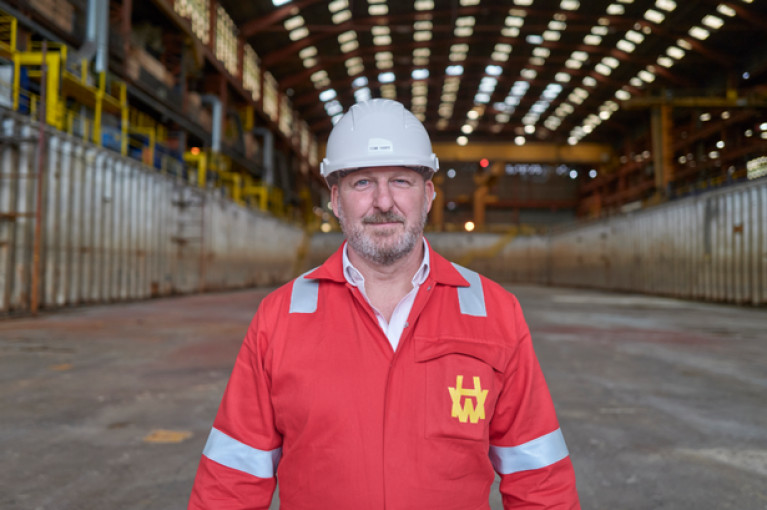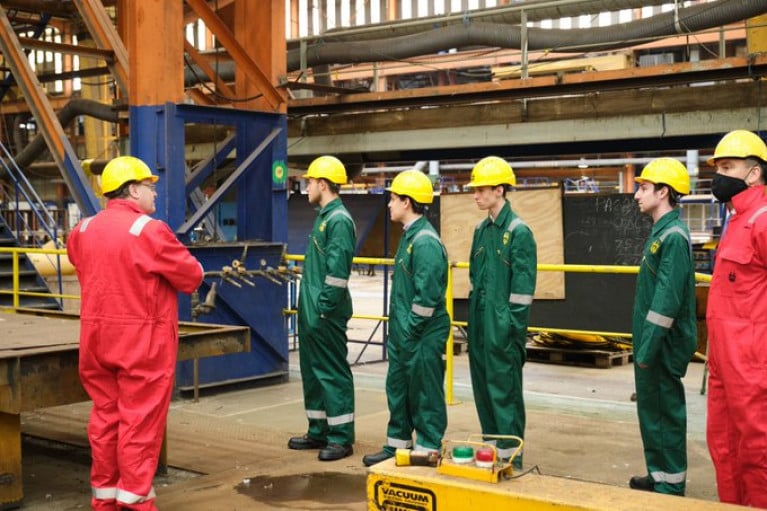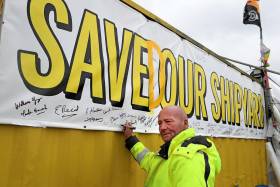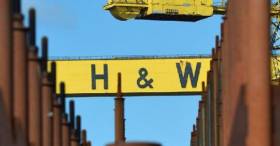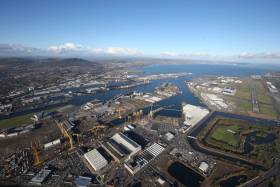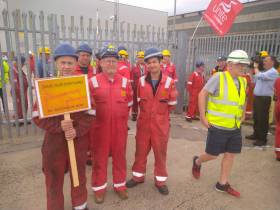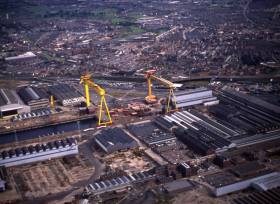Displaying items by tag: H&W
Parent company of Harland & Wolff has said it is ready to bid for an estimated £30m 10-year deal to dry-dock, repair and maintain two giant UK Royal Navy 'Queen Elizabeth' class aircraft carriers.
InfraStrata shut down large parts of its Belfast dockyard for four months last year to carry out maintenance and upgrades to ensure the shipyard was in a strong position to bid for the lucrative contract.
The yard will face opposition from one other facility, Rosyth on the east coast of Scotland, where the two 'QE' carriers were built.
More from the Belfast Telegraph.
As Afloat previously reported the pair of QE aircraft carriers, had involved sections of the vessels to be built throughout various yards, among them Appledore Shipyard.
The north Devon facility which built a quartet of OPV90 'P60' class for the Irish Naval Service, was last year acquired by Infrastrata.
H&W Appoints New General Manager at its Appledore Shipyard
Belfast's iconic Harland & Wolff shipyard, has announced the appointment of a new General Manager, Tom Hart to its Appledore shipyard in England, which was acquired a year ago.
Bringing over 30 years of experience in project, operations and construction management throughout the United Kingdom and United Arab Emirates, Mr Hart joins Harland & Wolff (Appledore) from Dubai based, Drydocks World where he was Director of Projects & Engineering.
He joins after the site has enjoyed major investment and upgrades since the InfraStrata plc acquisition and is now fully operational.
Mr Hart began his career in the Merchant Navy as a cadet before moving to P&O Ferries, where he rose through the ranks from Marine Engineer to Chief Engineer.
Moving shore-side, he then headed to the UAE to join Dubai Drydocks as a Ship Repair Manager. During his time in Dubai, Mr Hart moved from drydocks into the oil and gas industry, where he project managed new-build jack-up oil rigs and offshore wind turbine installation ships with MIS & Lamprell Energy. He also held various other positions such as Commissioning Manager and Group Operations Manager, where he ran three shipyards.
Mr Hart then returned to Dubai Dry Drydocks for a final two-year stint as Director of Project Management & Engineering.
Now in his role as General Manager, based in Appledore, North Devon, Mr Hart will be responsible for the overall day-to-day running of the site. This includes the organisation and logistics for all incoming projects, site safety and security as well as overseeing all monetary aspects.
Tom Hart commented: “Leaving Dubai to move “home” after 20 years was a huge decision but one that I, along with my family, are very excited about. I’m really looking forward to settling in at Appledore, and hope to share some great practices, and skills I have gained from my international experience to build up British shipbuilding and ship repair and be a part of its revitalisation. Building up business, creating work for the local community and increasing the yard’s revenue and margins with a steady flow of work will be my main goal. I am delighted to be appointed General Manager of Harland & Wolff (Appledore) – a yard with a very impressive history. I am looking forward to leading the team there and collectively bringing success to the Harland and Wolff Group.”
Harland & Wolff is a multisite fabrication company, operating in the maritime and offshore industry through five sectors: commercial, cruise and ferry, defence, oil & gas and renewables and six services: technical services, fabrication and construction, decommissioning, repair and maintenance, in–service support and conversion.
Its Belfast yard is one of Europe’s largest heavy engineering facilities, with deep water access, two of Europe’s largest drydocks, ample quayside and vast fabrication halls.
As a result of the acquisition of Harland & Wolff (Appledore) in August 2020, the company has been able to capitalise on opportunities at both ends of the ship-repair and shipbuilding markets where this will be significant demand.
In February 2021, the company acquired the assets of two Scottish based yards along the east and west coasts. Now known as Harland & Wolff (Methil) and Harland & Wolff (Arnish), these facilities will focus on fabrication work within the renewable, oil and gas and defence sectors.
Harland & Wolff is a wholly-owned subsidiary of InfraStrata plc (AIM: INFA), a London Stock Exchange-listed firm focused on strategic infrastructure projects and physical asset life-cycle management.
In addition to Harland & Wolff, it owns the Islandmagee gas storage project, which is expected to provide 25% of the UK’s natural gas storage capacity and to benefit the Northern Irish economy as a whole when completed.
Shipyard Harland & Wolff has launched an apprenticeship scheme that is available across all of their four sites either side of the North Channel and the Irish Sea.
The scheme is applicable to H&W Appledore, Arnish, Belfast and Methil, with the first intake of apprentices arriving on site in September 2021.
Applications will close at 5pm 21 May 2021.
To apply, prospective employees must complete the application form which can be found under the Apprentices page on the Harland & Wolff website. At this time, CVs will not be considered.
For successful candidates, the next stage will include an online assessment followed by an assessment day and interview on site.
We will be looking for team players who are motivated with good communication and practical skills. Prospective apprentices must also have five GCSEs/Standard Grades/Nationals or equivalent including Maths, English, Technical, Craft.
Kelly O’Rourke, Group Director of Human Resources commented: “I am very excited to be launching our first Harland & Wolff multi-site apprenticeship scheme which will be a key aspect of our development into the future.
This scheme uniquely offers apprenticeships across all four Harland & Wolff sites and the opportunity to build a career in a number of industry areas. Our apprentices will work alongside our highly experienced workforce, transferring valuable skills to the next generation.
We are aiming to recruit from local communities, as well as those from a wide range of backgrounds and talents as we seek to develop a diverse workforce.”
Workers at Harland & Wolff Cheer As they Return to Work
Employees according to Belfast Telegraph, have returned to work at Harland and Wolff after the sale of the closure-threatened shipyard.
There were cheers as the remaining staff walked through the gates in Belfast at 9am.
It followed a nine-week campaign which saw a worker-led round-the-clock occupation of the historic site – where Titanic was built – after it was placed into administration over the summer.
Workers claimed victory earlier this week when it was announced that a buyer had been found.
Harland and Wolff has been bought for £6 million by InfraStrata, a London-based company that specialises in energy infrastructure projects.
Steel worker and GMB shop steward Barry Reid described Thursday morning at the shipyard gates as “the day we prayed would come”.
Click this link for further details on this development.
Contract from Royal Navy Could be Vital Lifeline for Harland & Wolff Shipyard
Shipyard Harland & Wolff has taken a step closer to survival with confirmation that the consortium to which it belongs has been awarded a £1.25bn contract to build new warships.
As the News Letter reports, East Belfast MP Gavin Robinson described the decision – giving the green light for the Babcock-led consortium to build the Type 31e Royal Navy frigates – as a “boon” for the Belfast shipyard and said it was “hugely encouraging”.
The news come as Belfast Harbour launched a strategic plan to invest £254 million in new infrastructure which will help generate 7,000 new jobs.
The development at Harland & Wolff is a vital lifeline for a company that went into administration just over a month ago.
For more click here on the story
Shipyard: Harland and Wolff Insolvency Request to Be Filed
A formal legal process to place Harland and Wolff into administration will be completed later today.
As the BBC News reports an insolvency request is expected to be filed at the High Court in Belfast.
On Monday, the company announced that accountancy firm BDO had been appointed administrators to the Belfast shipyard.
Having employed more than 30,000 at its peak, the move could now put 120 jobs at risk and spell the end of the iconic firm, best known for building the Titanic.
Unions representing workers have called for the shipyard to be renationalised, arguing it would be cheaper for the government to keep the shipyard open.
However, the government has said the crisis is "ultimately a commercial issue".
For more on this story in addition to the history of the famous shipyard click here.
Emergency Meeting to be Held by Belfast Council In Bid to Save Harland & Wolff Shipyard
An emergency meeting is to be held by Belfast Council on Friday in a bid to help save the historic Harland and Wolff shipyard from closure.
The meeting writes Belfast Telegraph has been called by SDLP councillor Brian Heading and Green party councillor Anthony Flynn and will take place at City Hall at 1.30pm.
They have tabled a motion which would see the council convene an urgent forum between Trade Unions, Invest NI, the Department for the Economy and the UK Government to secure the future of the shipyard.
Administrators are set to be appointed at Harland and Wolff on Monday.
Since the news was announced members of the shipyard's 130 staff have protested at the gates in Belfast docks, calling for an intervention to save it from closure.
The newspaper has more here on the story.
Shipyard Crisis: Harland and Wolff 'Is a Commercial Issue'
BBC News reports that the UK government has said that the crisis at the Harland and Wolff shipyard in Belfast is "ultimately a commercial issue".
Unions say the yard is at imminent risk of closure and have called for it to be nationalised.
A government spokesperson said there was "every sympathy for the workers". They added that the government will "do all it can" to offer support.
It is understood administrators are now expected to arrive on Monday.
The firm's Norwegian parent company Dolphin Drilling is having serious financial problems and put Harland and Wolff up for sale late last year.
There were exclusive negotiations with a potential buyer but they cooled in the last two weeks.
For more on the 'commercial issue' click here.
Harland and Wolff workers, writes BBC News, have closed the shipyard's gates as part of a protest following news that the business is up for sale.
They have demanded Boris Johnson's government renationalise the yard and saves their jobs.
The protest began on Monday afternoon and has continued into the night.
The Unite union said workers decided to take this action ahead of the expected arrival of administrators on Wednesday.
A spokesman for the Norwegian parent company of Harland and Wolff said the company had no comment to make at this stage.
For more on the story, click here.
Concerns Grow for Harland & Wolff Shipyard Belfast
Harland and Wolff shipyard in Belfast reports BBC News, can only survive until the end of the month without a deal, Unite the Union has said.
The business has been up for sale amid serious financial problems at its Norwegian parent company.
Trade unions have been hoping that the yard could benefit from plans to build more Royal Navy ships in the UK.
But now fear there is a risk that it will not survive for long enough to participate in that.
Susan Fitzgerald, the regional coordinating officer with the Unite trade union told BBC News NI's Evening Extra programme that if the yard the government needs to step in.
The yard employs around 130 people and specialises in wind energy and marine engineering projects.
It is also part of two consortia which are bidding for work on the Navy's new Type 31e frigate.
For more click this link.


























